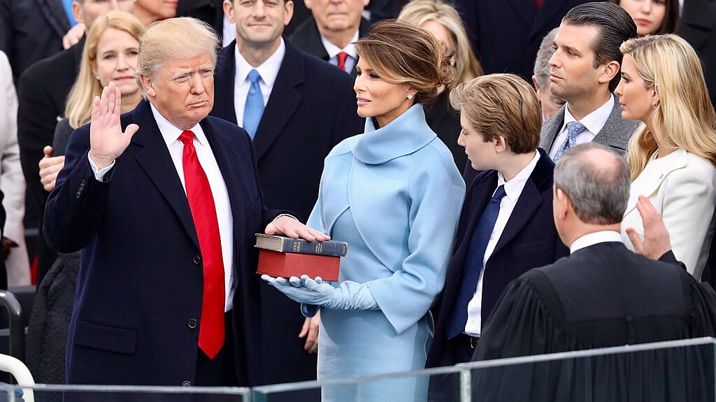
With a scale of victory that defied the pollsters, the media and many of his own supporters, ‘King Donald’ looks to have achieved the elusive trifecta — the White House, the Senate, the House of Representatives. Together — most surprising of all — with the national popular vote, normally a Democrat shoo-in even when losing the presidency. The shift away from the Democrats by so many Black and Latino voters will be the subject of both political and academic inquests for years to come, and cannot simply be pinned on inflation and immigration outgunning abortion right and threats to democracy as decisive issues. Polls in the US (echoed by some in Europe and even the UK) indicating worrying numbers of young, mainly male voters not averse to the idea of democracy-bending strongmen leaders must be part of that inquest.
So, Trump’s history of convicted felon, insurrection instigator, foul-mouthed sex abuser and thinly disguised racist and misogynist clearly didn’t deter more than 71 million Americans from wanting him back in the White House.
In addition, the Supreme Court, already loaded with conservative judges from Trump’s previous presidency, will be tilted further to the right by his ability to appoint at least one more supportive right winger during his second term.
Threats to the legacy media
All of the above augurs well for a narcissist with autocratic ambitions and an appetite for seeking revenge and retribution against his enemies.
Not least a legacy media he has long targeted as the ‘enemy of the people’ and part of an unproven ‘deep state’ conspiracy against him.
As CNN commentator Hadas Gold wrote on November 8: “President Trump has vowed to go after much of the media in his second term, threatening to jail journalists, revoke broadcast licences and target outlets with a flurry of lawsuits. On the campaign trail, Trump employed dark and violent rhetoric to attack the media — telling a crowd this week that he wouldn’t mind if journalists got shot — and sparking fears he will attempt the weaponise the government against the free press.
“Experts on authoritarian leadership in Europe say that in a second term, enabled by more loyalists and fewer guardrails around him, Trump could do extensive damage to press freedom in the United States.”
One senior Trump-sceptic figure in the Republican party didn’t demur from Ms Gold’s grim vision, telling me: “If he could, Trump would like to rewrite the First Amendment to his own liking. Thankfully, that’s beyond even his dictatorial ambition, but he could still stress test it in a way no other president has attempted.”
How? Signs are already there that Trump may use his power to disbar journalists from media outlets he dislikes or considers ‘hostile’ from White House press conferences, prevent them from asking questions or deprive them from seats on Air Force One during presidential trips at home and abroad. Already, Team Trump are reportedly drawing up tougher new laws on ‘leaks’ — an essential element of the media holding power to account — that would see journalists jailed for publishing stories politically damaging to the administration beyond those that arguably endangered national security. Already, too, the president-elect is announcing planned key appointments via either his own Truth Social platform or Elon Musk’s X — a pattern that might well continue even after he’s reinstalled in the White House.
Sharon Moshavi, president of the International Center for Journalists, warns: “Governments around the world controlled by authoritarians and strongmen, including Russia, Hungary, India and, until recently, Poland, have moved to muzzle the free press and crush dissent. Trump has praised the leaders of these nations, especially Hungary’s far right prime minister, Viktor Orban. It’s death by a thousand cuts from multiple angles... applying pressure on media owners to induce self-censorship, launching legal challenges and leveraging wealthy allies to buy up media outlets to turn them into government mouthpieces. You see a lot of owners, a lot of big owners who have other interests, start to put pressure on their own staff.”
Northwestern University professor Olga Kamenchuk went on the record to argue that the shock decisions by the billionaire owners of the Washington Post and Los Angeles Times to halt planned endorsements of Kamala Harris “appeared to be an example of indirect pressure and self-censorship”. Both owners, including Washington Post proprietor and Amazon multi-billionaire Jeff Bezos, have denied the suggestion but it is one unlikely to go away during a Trump second term. Amazon, for example, has multi-billion dollar government contracts to ‘protect’.
Whether the endorsement refusals will satisfy Trump remains an open question. After all, both the LA Times and Washington Post news coverage, together with the majority of its opinion columnists, was broadly anti-Trump (along with the New York Times). But here I need to make a personal confession. In my last pre-election column, I reported on how some journalists on smaller titles and broadcast stations in Trump-friendly areas had revolted against management demands for ‘equivalence’ (AKA tone down negativity about Trump) and had quit their staff jobs and launched their own blogs and websites. What I certainly hadn’t bargained for was that such liberal bastions as the LA Times and Washington Post would ditch their traditional endorsement policies. But senior staff resignations and, in the Washington Post’s case around 300,000 readers cancelling their subscriptions in protest, will probably register as a price worth paying by the billionaire owners to try and avoid Trumpian wrath.
Another personal confession required here. Although readers might recall my last columns did envisage the strong likelihood of a Trump victory (while hoping to be wrong), the scale of it absolutely dumbfounded me.
But in the US, Trump’s landslide triumph (all seven supposed swing states went his way) has inevitably — like it or not — triggered a serious debate / inquest into the diminished power and influence of the MSM. Certainly compared to that of the (all too often) wild west of social media, personified by the president-elect’s new best friend and major bankroller Elon Musk with his X behemoth — but reinforced by hundred of other conservative platforms of varying sizes but united in their cause of undermining or even hoping to destroy liberal legacy media. Musk, meanwhile, appears guaranteed a big role in the Trump 2.0 administration, including that of a ‘crackdown czar’ on state spending while also boosting his position as the world’s richest man and getting presidential support and massive state financial backing for his pet project — colonising Mars.
For those right-wing media voices in the UK noisily demanding that Keir Starmer sack David Lammy over his colourful past remarks about Donald Trump, it’s worth noting that, in his more liberal days, Musk used the N-word — Nazi — about The Donald. Ditto his vice-president, JD Vance. Which just goes to show that this unpredictable president-elect is both a man notorious for bearing grudges but who conveniently forgets them when it suits his purpose.
Future relations with Britain won’t be decided by what Lammy and Starmer himself said about Trump a few years ago but what this most transactional of presidents figures to be in his and America’s best interests, and that includes the thorny issues of tariffs, trade wars, climate change, defence and most immediately, perhaps, the Ukraine War. On the latter front, the curious story of a supposed Trump phone call talking tough ‘don’t escalate’ language to Putin over Ukraine and leaked to the Washington Post and Reuters before going global is fascinating. The Kremlin claims it’s “pure fiction”, the Trump camp won’t confirm or deny and the question of, true or not, who leaked it and why remains pertinently intriguing.
UK media’s reaction
So, what did the UK media make of Trump’s stunning victory after November 5th and its implications for Britain and Europe not just America itself? If nothing else, it flagged up the polarisation likely to last through the next 4 years.
The New European’s apocalyptic front page featured an image of the Statue of Liberty with a gun held to her head and the headline ‘The End’ and, inside, a 9-page ‘Election Special: Trump wins...The World Loses’. It included a Matthew D’Ancona spread headlined ‘Where the Darkness prevails’ in which the writer asked, “So was it the economy and inflation that did it? Or was it Kamala Harris’s inability to define herself? Or was it Joe Biden’s stubborn refusal to drop out until late in the electoral cycle; or, conversely, his failure to stand his ground, thus robbing the Democrats of the only candidate who has ever beaten Trump. Doubtless all of these and many others will feature in the lengthy autopsy and audit to come. But they do not capture the sheer scale of the moment, its thunderous force and tectonic origins. The rationalisers will be doing themselves and the progressive cause they espouse no favours if they do not fully confront the immensity of what has just happened.”
D’Ancona continued, “As Biden might say, here’s the deal; the American people were presented with a convicted felon, twice impeached, found liable by jury for sexual assault, awaiting trial for electoral subversion and chose him, by some margin, over a serving vice-president, former senator and state attorney-general who spoke sensibly, rationally and with poise about the future of their country. Trump, let us not forget, is a man described by his former chief of staff, General John Kelly as fitting “the general definition of a fascist” — a verdict shared by General Mark Milley, former chairman of the Joint Chiefs of Staff, who called him ‘the most dangerous person to this country ...a fascist to the core’.
From where I’m sitting, there is much to agree with about D’Ancona’s column, albeit I had written that Joe Biden needed to stand down long before Nancy Pelosi, Obama and others belatedly forced him to bite the bullet. That way, an open, orderly nomination process could have taken which Kamala Harris might or might not have won. Instead, the Harris ‘coronation’ offended many Democrat-voting friends of mine and was another undoubted factor in her defeat — despite her overwhelming support among celebrities. On November 5th, in the land of celebrity power, celebrity proved not to be the decisive weapon Democrat strategists had pinned so much hope on.
Meanwhile, those pending criminal proceedings and investigations are now almost certainly destined to disappear into the black hole of unresolved history with Trump embedded back in The White House with all the self-protective powers bestowed by the presidency.
But the position of the military strikes me as potentially the first big explosive test of the Trump 2.0 presidency. Having previously pitched himself as a ‘Day One dictator’ if re-elected, he claims he will immediately launch his master plan to forcibly deport millions of ‘illegal migrants’ and deploy the military to enforce it, along with the threat to use them against public protests he defines as ‘unacceptable’. But several senior US generals are briefing that deploying the military in such circumstances could be an “illegal” breach of the constitution itself.
Elsewhere, on the UK newspaper landscape, the early response to Trump’s triumph reflected left and right leanings predictably enough. ‘Cheers and fears across the Pond’ as one US commentator described it as Trump’s face dominated every UK front page (many more of those to come guaranteed).
My old berth, the Mirror, billed it as a “dark day for America and the world” with an editorial opining, “Trump won by stoking divisions and whipping up hatred. It is inevitable he will govern the same way. There will be no let-up in the war on women’s rights. America will not be a safe country if you are a migrant or a member of a minority. The dark shadow of Trump’s election stretches far beyond the American mainland... allies of the US must prepare for a new world order under a president who favours tyrants and strongmen such as Vladimir Putin over them.”
What the Mirror didn’t immediately allude to is the challenge it poses to the Starmer government and the PM’s claim to have developed a good relationship with the incoming Trump regime despite its trade deal threats, depiction of climate change as a ‘hoax’ and the evidence that Trump’s policy toward Ukraine won’t be anywhere near Britain’s declarations of ‘total support’ . The latest posts by JD Vance and Donald Trump junior (who some say will not only play a senior policy role in his father’s administration but who Donald senior even sees as a successor in establishing a lasting Trumpian dynasty in the White House) will delight Putin and terrify President Zelenskyy and Ukraine’s European allies.
Over at The Guardian, the immediate reaction was a stark front page featuring a smirking Trump and the headline ‘American Dread’ and an editorial arguing, “from abortion to immigration, the environment, gun laws and LGBTQ+ rights; all are at stake with Trump and his allies back in power.”
By contrast, the Daily Mail heralded Trump’s victory as a “genuinely amazing and historic comeback”, overtly “wishing him well” in his second term. Since then, the Mail has somewhat opportunistically pressed the case for the UK government to seek a ‘special relationship’ trade deal with the Trump government, notwithstanding that it could put the UK further at odds with our larger EU trading market if Trump forges ahead with his tariffs plan. If the president does, then it might well reopen the Brexit debate and the case for Britain rejoining, or at least reaching a compromise accord, on the Single Market and the Customs Union. Unsurprisingly, the Mail, along with the Express and, to a marginally less vocal chorus, the Times and Telegraph, have been questioning whether Foreign Secretary Lammy’s past attacks on Trump warrant his removal from that office. Keir Starmer’s response suggesting that Lammy will remain this whole parliament could yet come back to haunt him over the next year or two. No doubt either, it will be a recurring attack line by new Tory leader Kemi Badenoch, judging by her student politics level PMQs debut.
The Times did, however, focus a leader page ire on Lammy’s “less than favourable approach to Mr Trump and, therefore, the incoming US government. Fence-mending will be necessary, together with the realisation that the US blank cheque for European defence is about to be withdrawn and replaced with a hefty bill” adding rightly that a “protectionist US will be a direct threat to so-called Global Britain”.
While the Mail could find itself at odds with Trump if the president does ‘sellout’ Ukraine to Putin, given the paper’s strong pro-Ukraine war and its previous declaration that Starmer should defy President Biden’s refusal to sanction long range missiles provided by the West being fired deep into Russia. Something Donald Trump is hardly likely to sanction either, as he pledges to slash the billions of dollars of weaponry supplied to Ukraine by the Biden administration, while pointedly mocking President Zelenskyy as the “world’s best salesman”.
For all the Mail’s supportive words and those of Keir Starmer, the brutal truth for Ukraine is that, without America, the UK and other European nations lack the hardware and weapon production capabilities to effectively sustain its resistance to Russia’s advancing invasion; forcing it to the negotiating table demanded by Trump and on terms that would inevitably relinquish significant sovereign territory to a ‘victorious’ Putin.
For its part, The Sun, with characteristic cheekiness, declared that wasn’t at all surprised “by the second coming of President Trump”, boasted it had clearly seen it coming and “wishing him luck in his return to the Oval Office”.
Over at that sinking circulation ship, The Daily Express, it welcomed the US result and declared it an “important lesson for UK and European politicians. Many politicians here in the UK, not least in the Labour Party, regarded the prospect of his re-election with horror... America’s allies now need to work with the President elect.” The paper demanded an end to “political mudslinging”, rather ignoring the fact that when it comes to political mudslinging, Donald Trump is the world champion and highly unlikely to change his spots second time around.
The Express front page following the result left its position in little doubt with its headline, ‘A Comeback to Trump all comebacks’ with sub headings including ‘Liberals in US and Britain left bewildered and tearful’... ‘It’s a nightmare for Starmer and his Donald-loathing Cabinet’. Inside, it also gleefully (if not inaccurately) pronounced ‘He’s been shot, convicted of a crime, branded a fascist ...but he’s still the people’s choice.”
Predictably, the Express has also been eager to big up its hero Nigel Farage’s offer to Starmer to use his personal ‘special relationship’ with Trump to secure a favourable trade deal for the UK compared to other nations on the incoming POTUS’s tariff hit list. It’s true that Farage, while not called onstage at Trump’s victory celebration as he might have hoped, was singled out for a personal tribute and the invitation to stand up and take a bow. The Reform leader can look forward to more praise being heaped on him by the new/old president but whether that can run to swinging a favourable trade deal for the UK is extremely doubtful unless Trump’s transactional terms (especially on food standards and US companies’ access to the NHS) suit the US far more than a British government dare accept. Unsurprisingly, Keir Starmer declined Farage’s self-promoting offer and it’s hard — at least for now — seeing the PM change on that this side of the next general election.
Finally, it’s worth recalling that America boasts of introducing the rollercoaster to the world (a claim historically challenged by Russia as it happens). But, indisputably, the media on both sides of the Atlantic and all around the world will experience one helluva of a democracy stress-testing Trumpian rollercoaster ride after January 20. How much fun and how dangerous that ride turns out to be and how sick a free press is left feeling at the end of it will be a very, very big question.
Addendum…
On 15 November, Paul writes ...
Monarchical mayhem reigns?
Nothing epitomises the absolute autocrat ambitions of ‘King Donald’ than his controversial emerging list of nominees for key government roles, with total ring-kissing loyalty to the incoming president and his MAGA cause ‘trumping’ such considerations as ability, integrity, experience. Some are so unexpected that several senior Republican figures are briefing their ‘outrage’. As a headline on the UK-based Tortoise website aptly put it: ‘Trump Trolls America’.
So much so that certain Republican senators are even indicating they may vote with Democrats to block Trump’s more outlandish appointments. A possibility that apparently has Team Trump considering doing something no POTUS has ever attempted before, using an obscure line in the Constitution to suspend Congress temporarily while pushing through his nominees and bypassing the Senate approval process. One dark joke doing the Capitol Hill and liberal media rounds is that the list will qualify Fox News as ‘an official branch of the Trump government’. Or, as one rebellious GOP senator put it to me: “Shades of Boris Johnson proroguing your parliament over Brexit.”
The Trump nominees who could struggle most to survive proper senate scrutiny are:
- Controversial ‘firebrand’ Florida congressman Matt Gaetz as attorney general with a brief to shake up a Justice Department the incoming president has long considered too independent of government and resented over its past investigations into him. But Gaetz, a Fox News regular, is not only hugely unpopular with many of his GOP colleagues but is the subject of a house ethics committee report into allegations of sex trafficking and “sexual misconduct, illicit drug use, accepting improper gifts, dispensing special privileges and favours to individuals with whom he had a personal relationship and seeking to obstruct government investigations into his conduct’. He is also alleged to have paid for sex with a minor. Quite a ‘charge sheet’ for the man Trump wants to head the US legal system!! Gaetz, who denies the allegations, resigned from Congress on being nominated by Trump and in a move designed to block the release of the Ethics Committee report which is believed to be damning. On Capitol Hill, the smart money says, expect it to be leaked to the media very soon anyway.
- Fox News host Pete Hegseth, 44, as defence secretary in charge of the most powerful military force on earth with an $850bn annual budget, 3 million ‘employees’ and picked in preference to senior, experienced 4-star generals. Although an army veteran himself, Hegseth never officially reached higher than captain (he was only a temporary major) which puts him eight rings below the seniority level of any previous military recruit to the secretary of defence position!! But he is an ardent, uncritical Trump fan who has declared his ambition to launch a “frontal assault” against “liberal top brass”, kick women out of combat roles and crackdown on LGBTQ+ engagement in the military. To say his nomination has sent shock waves through both present and past military experts would be a massive understatement with Hegseth being branded “the least qualified defence secretary in US history’. But Trump is known to be an enthusiastic follower of his Fox News show on which the president-elect has been a frequent guest.
- Tulsi Gabbard as director of national intelligence certainly triggered disbelief throughout the US intelligence community. Not only was she a Democrat presidential candidate as recently as 2020 before suddenly converting to Trump-adoring Republican in 2022, but the former army reservist and national guard member has publicly praised Putin, paid a mysterious visit to Syrian dictator Assad and has taken a strongly isolationist approach to US foreign policy. Another Fox News regular too.
- Robert Kennedy junior as health secretary is widely seen as a blatant reward for him ditching his own independent run for the White House and throwing in his lot with Trump, a decision that has outraged the Kennedy clan. Equally outraged are the majority of the US medical world who think RFK’s extreme anti-vaccine campaigning could trigger major epidemic crises, especially among children. Several Republican senators are known to be opposed to his nomination.
- Kristi Noem as head of homeland security. The controversial South Dakota governor was once considered as his VP running mate by Trump but lost out to JD Vance on the advice of Donald Trump junior. Something of a covid-sceptic who mocked face masks during the pandemic, she has been sympathetic toward those who stormed Capitol Hill on January 6th and would probably support Trump’s pledge to pardon many of them. She also provoked fury among millions of animal lovers when she wrote about shooting her “misbehaving” pet dog.
- Todd Blanche as deputy attorney general is another pick who might struggle for Senate approval. He’s been Trump’s personal lawyer for the last 18 months, defended him in the Stormy Daniels ‘hush money’ case in New York and has echoed the former president’s false claims of the 2020 election being stolen.
But one Trump nomination and Fox News regular certain not to be blocked by an any Republican / Democrat alliance is that of Mike Huckabee to the ultra-sensitive post of US ambassador to Israel. The multi-millionaire former Arkansas governor and Republican presidential candidate is a staunch ally of the hard right members of the Netanyahu government, an opponent of the internationally-recognised 2-state solution to the Palestine issue, rejects the international legal ruling that Israel is unlawfully occupying the West Bank, supports the illegal Israeli settlements there and generally supports Israel annexing more territory in the area. He is on record as declaring “Israel has title deed to Judea and Samaria” pointedly using the language of the Israeli right to refer to the Palestinian area captured by Isarel in the 1967 Middle East war and known now to most of the world as the West Bank. Huckabee has said that if the Palestinians want a country of their own, they need to move somewhere else to find it. Needless to say his nomination has delighted Israel’s hard right politicians and media while outraging liberal media and political voices there and casting a dark shadow over any genuine peace deal prospects under the Trump administration.
But one controversial / influential Trump appointment that almost certainly won't be subject to senate approval at all is Elon Musk. Because the Department of Government Efficiency he’s been picked to lead isn’t technically part of the administration, the X tycoon can escape Capitol Hill vetting.












